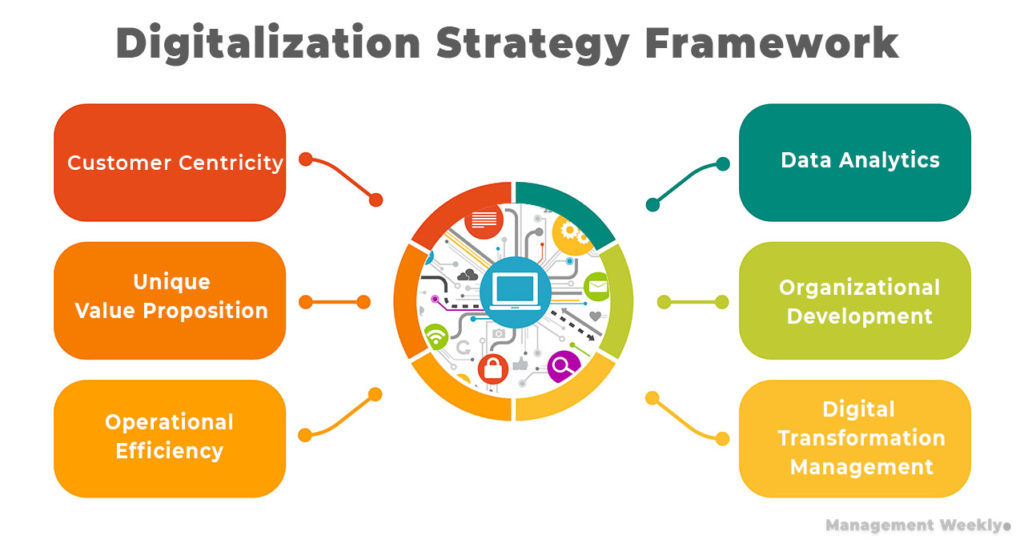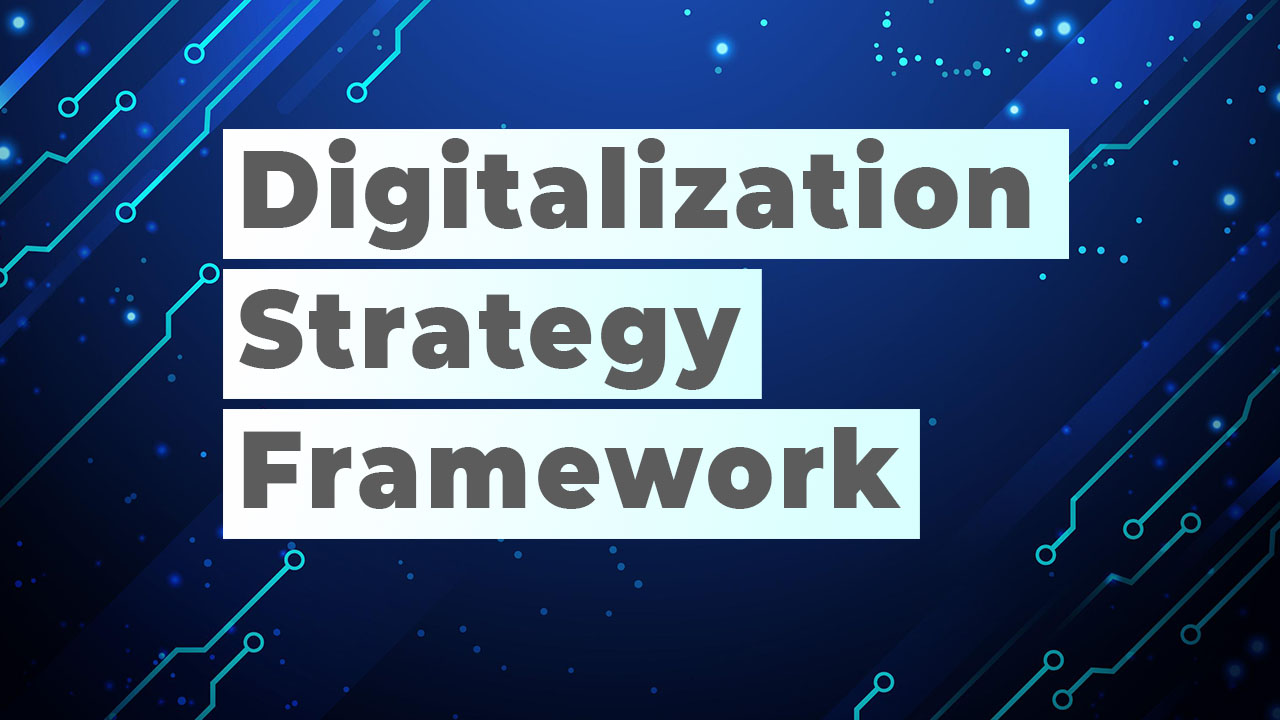Target invested heavily in the digitalization of business. It has been one of the driving forces behind the steady rise from a stock price of $53 in 2006 to $204 in 2021. Digitalization strategy framework can go a long way in ensuring sustainable competitive advantage for firms. However, successful transformation requires relentless effort, dedicated funding and unending support from top management. According to a report from Forbes, about 84% of digitalization strategy fail.
Contents
Executive Summary
Digitalization is crucial to the going concern of contemporary businesses. Typically, it has been shown that digital leaders reap higher benefits from digitalization. However, with the right approach, any organization can lead a successful digitalization strategy. The key points that drive success are:
- Development of a digitalization strategy framework
- Commitment from executives
- Focus on developing internal competencies
- Change management
What is Digitalization Strategy? Is it same as Digitization?
The two terms digitization and digitalization are seemingly similar. However, they are not the same. Digitization refers to the transition from analog format to digital. For instance, adopting online forms rather than a physical printed form for opening a bank account. On the other hand, digitalization refers to the act of transforming your business model on to a digital platform.
The digitalization strategy is objective evaluation of a company’s business model and assessing the future. Subsequently, the digitalization strategy framework needs to be developed. Research shows that these transformations usually have the following properties:
- Driven by proactive approach
- Requires higher co-ordination between different levels of the organization
- Long term orientation helps
“At least 40% of all businesses will die in the next 10 years… if they don’t figure out how to change their entire company to accommodate new technologies.”
John Chambers, Cisco
We looked at recent publications that have talked about the digitalization strategy frameworks. The findings of these research are provided below. Overall, these papers have talked about the drivers of digitalization as well as the framework development process.
Digitalization Strategy Framework
Researchers from University of Cambridge, found out that there are factors that can drive the success of digital transformation. Their findings can be quite useful in developing a digitalization strategy framework.
Proactively initiate the transformation process
Firms that are proactive in adoption of technology are the leaders. Typically, they enjoy greater success from the technology compared to laggards. Given a choice, everyone would want to be a leader. However, larger firms have the advantage of accrued capital, organizational learning as well as human resource. Also, certain industries are better poised to take advantage of digital. For instance, industries like retail and manufacturing embraced digital platforms much earlier than industries like agriculture and energy.
However, the technology transformation need not be looked from this perspective only. Some research also show that companies can succeed regardless of their time of adoption of a technology. What matters is a proactive approach in assessing the market risk and acting accordingly. Certain process industries like biotechnology and energy have shown remarkable use of digitalization strategy framework and succeeded.
Integrate digital strategy with business strategy
Firms can improve their processes by optimization and upgradation. Information technology has been shown to be a powerful tool of modernizing a business. Some firms relegate technology to the specific departments and focus on other aspects of doing business. This process is not wrong. However, it diminishes the dedication required for success of technology transformation. The digitalization strategy framework suggests that business should adopt new technologies to improve efficiency, enhance customer satisfaction and increase profitability.
Incorporate IS experts in top management
Top managers who have a background in technology provide valuable insights. Particularly if they have experience in areas like information systems, data analytics, innovation and digital transformation. This knowledge is essential in providing a direction to the initiatives. They can also provide timely feedback about the issues in implementation and suggest appropriate course corrections.
Learning and Development
There is a sea of evidence that suggests that digitalization is often met with resistance. One of the common reasons for this resistance is that the employees lack relevant skills. Top executives who overlook this critical aspect, pay dearly. We opened this discussion with the disturbing finding from Forbes. Digitalization strategy is successful only for one in eight cases. Nevertheless, appropriate attention to the learning and development may increase the chances of success.
Prescribed Actions for Digitalization Strategy Framework
Another powerful framework was developed by researchers from University of Augsburg, Germany. They have prescribed six action fields for the digitalization strategy framework. Their model talks about customer, value proposition, operations, data, organization and transformation management. We have modified the framework slightly for better explanation of the terms.

Customer Centricity
The customers are the core around which businesses revolves. At least that is what contemporary theories in marketing tell us. Long gone are the days when you made a product in your labs, pushed it to the market and prayed for it to be bought and enjoyed by the customers. Digitalization goes a long way in helping firms become more ‘customer centric’ from being ‘product centric.’
Clive Humby coined the phrase “data is the new oil.” However, in order to make use of data, we need infrastructure for data collection, storage, analysis and reporting. Organizations need to transform themselves into a data centric organization before, they can become customer centric. Modern customer relationship management also goes beyond the loyalty programs. It encompasses omni channel management. Firms also benefit heavily from customer experience management.
Unique Value Proposition
Digitalization strategy framework also provide a unique value proposition. Firstly, the digital platforms provide better integration with customers. Secondly, it increases the convenience for the customers. Thirdly, it helps in customization of products and services.
A firm may focus on any of these or all of these aspects. It is important to understand that traditional offline streams are not redundant. In fact, digital platforms help in creating a seamless management system across omni channels. Also, certain manufacturers are now able to provide fully individualized products. Customers can use mobile applications to select the features they want and then they can place order.
Operational Efficiency
Successful firms like Ryan Air and Toyota highlight the importance of operational efficiency. These firms have succeeded in hyper competitive markets, based entirely on improving operational efficiency and therefore product quality, reliability and customer satisfaction.
Digitalization in 2020s is helping firms integrate the hidden areas of manufacturing. IoT and centralized ERP systems are helping firms in gathering data in real time. The next big industrial revolution is the Industry 4.0. It will increase the connectedness of the organization. Therefore, it is highly recommended to have a proactive digitalization strategy for transitioning into industry 4.0.
Data Analytics
We have previously mentioned that data is considered to be the new oil. Consequently, we have witnessed a huge surge in the generation of data. Everyday we produce about 2.5 quintillion bytes of data. However, Gimpel et al (2018) argue that our decision making has not developed at the same pace as our data analytics systems have developed.
It is quite interesting to note that a major proportion of the executives believe that data analytics provides them with deeper insights. Analytics also plays a part in developing better products and services. It also helps them in managing customer relations better. However, at the same time, executives have not dedicated enough resources to develop the competencies required for collecting, processing, analyzing data and converting analysis results into tangible value.
Organizational Development
This brings us to the next point. Organizational development is pertinent to the success of Digitalization. Executives who want to develop a digitalization strategy framework must understand the challenges. One of the issues with executives is that they are looking for quick fixes. This results in poorly thought out strategy for the adoption of new technology.
The digital business processes are challenging to handle. Modern firms deal with fragmentation, uncertainty, resource requirements and external dependencies. Firstly, it is important to make the organizations agile. Not at a flavor of the month, but as a deeply enshrined value. You may also read our article on elastic digital workplace, which is said to be the workplace of the future. However, it is vital to chalk out a organizational change management strategy for the organization. Further, it should be centered around your digital strategy.
Digital Transformation Management
Finally, organizational transformation is all about execution. It requires transformational leadership and commitment. There are some crucial steps in this process:
- Development of digitalization strategy framework
- Change management
- Learning and development management
- Digital evangelism
- Digital transformation project management
The success of any transformation depends a lot on the top management of the firm. The top executives need to demonstrate the importance of the digitalization projects. A new management title has been adopted by some companies, the DTO. The Digital Transformation Officer orchestrates these projects.
Academic References
Gimpel, H., Hosseini, S., Huber, R. X. R., Probst, L., Röglinger, M., & Faisst, U. (2018). Structuring Digital Transformation: A Framework of Action Fields and its Application at ZEISS. J. Inf. Technol. Theory Appl., 19(1), 3.
Muehlburger, M., Rueckel, D., & Koch, S. (2019). A framework of factors enabling digital transformation.
Zomer, T., Neely, A., & Martinez, V. (2018). Enabling digital transformation: An analysis framework. Présenté à 25th EurOMA, Budapest, Hongrie. En ligne https://cambridgeservicealliance. eng. cam. ac. uk/resources/Downloads/Monthly, 20.
